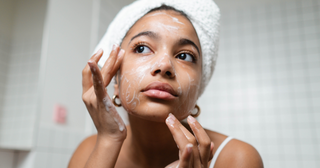If you have a sensitive skin, you might have experienced allergic reactions caused by your skincare products. Recently, “hypoallergenic” skincare products have grown in popularity. Today, we unwrap what it is and how it benefits our skin health.
What does Hypoallergenic skincare mean?
According to the FDA,
“Hypoallergenic cosmetics are products that manufacturers claim produce fewer allergic reactions than other cosmetic products.”
“There are no Federal standards or definitions that govern the use of the term "hypoallergenic."
It means it’s a word created for marketing use by the cosmetic industry.
A Cosmetic chemist, Erica Douglas of Sister Scientist, explains,
"Typically, most brands use the term 'hypoallergenic' to signify that a product contains fewer ingredients that are known to cause an allergic reaction—emphasis on 'fewer' because there are so many known allergens and no universal governing standard of what ingredients are classified as 'known allergens.' Therefore, it is impossible to be for certain that a product will not cause an allergic reaction in 100% of users." - What Hypoallergenic Really Means in Skincare and Cosmetics, BYRDIE.
Even though these products have fewer active ingredients, we should check the ingredients list when buying them. As people have a variety of allergies, it’s better not to 100% rely on the label but to protect yourself by learning what ingredients are allergic to you.
What are common skin-allergic reactions?
The most common allergic reaction is cosmetic contact dermatitis (CCD).
It happens when the skin's epidermis has hypersensitivity to chemicals or ingredients in cosmetic products and causes reactions such as rashes, irritation, and burning.
These symptoms develop where the products are applied and sometimes evolve to a wider area.
The ingredients list that sensitive skin should avoid…
- Alpha Hydroxy Acids
- Vitamins (A, B, C & E)
- Salicylic Acid & Benzoyl Peroxide
- Retinol
- Hyaluronic Acid
- Niacinamide
- Essential oils
- Fragrances
- Any exfoliating ingredients
As listed above, avoid products with fragrances as they are the leading cause of CCD.
They can easily breach the skin’s outer defence layer. When it happens, our body assembles a task force to fight against it quickly and quietly. However, with sensitive skin, the body releases histamine and other inflammatory mediators, which cause inflammation.
If you have eczema, psoriasis, and dermatitis, avoid applying any type of products with fragrances.
The list of ingredients suitable for sensitive skin is…
- Caprylic/capric triglyceride
- Cetearyl alcohol
- Glycerin
- Glyceryl stearate
- Hyaluronic acid
- Squalane
- Jojoba oil
- Ceramide
- Chamomile
- Dead Sea minerals
When looking for products for sensitive skin, look for “dermatologically tested” products. It means the products underwent RIPT(repeat insult patch test). This is a test operated on a group of people with sensitive skin, monitored by dermatologists.
At Dead Sea Dream, our products are suitable for all skin types. Dead Sea minerals have natural anti-inflammatory properties that help soothe and calm irritated skin, while deeply nourishing and promoting skin’s pH balance.
Shop our collection exclusively today.
